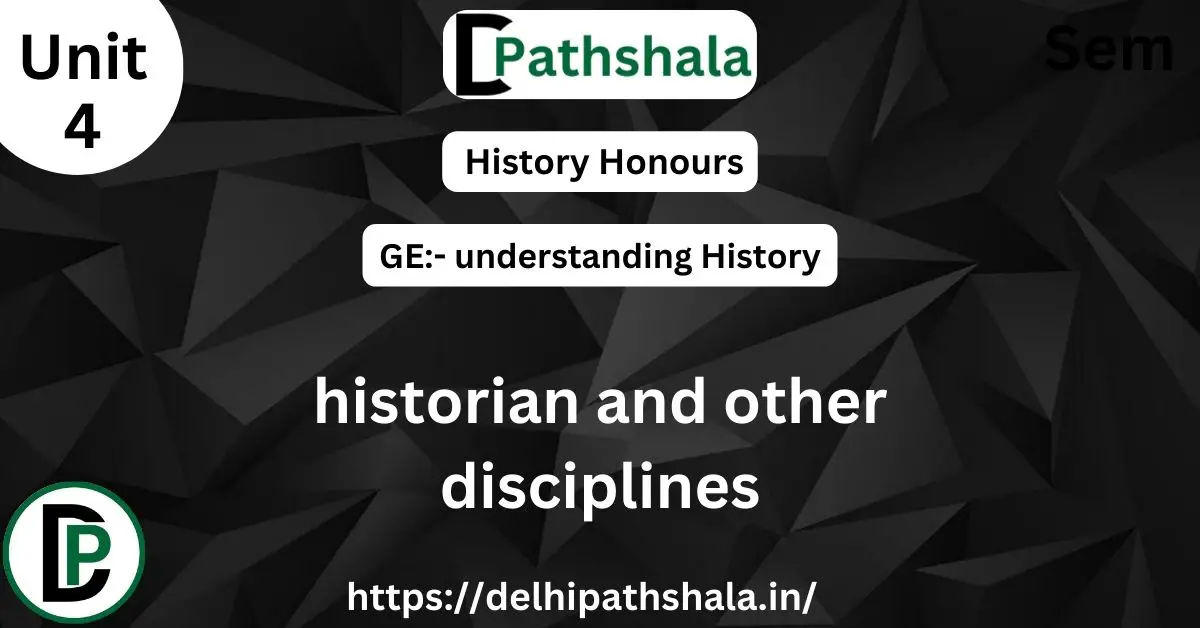In this post, notes of “Unit 4: The Historian and Other Disciplines“ from “GE: Understanding History” are given which is helpful for the students doing graduation this year.
Unit 4: The Historian and Other Disciplines looks at how history connects with other subjects and how historians work with these areas. It shows that history is related to fields like archaeology, anthropology, sociology, economics, and political science. Knowing how history relates to these subjects helps historians understand the past better.
1. History and Archaeology
- Working Together: Archaeologists study physical remains like tools and buildings, while historians look at written records. Together, they give a fuller picture of the past.
- Supporting Evidence: Archaeology provides physical proof that can help or question historical stories. For instance, digging in old cities can reveal details about daily life and social structures.
- Dating Artifacts: Archaeology helps historians figure out when things happened by dating artifacts, which gives context to historical events.
2. History and Anthropology
- Cultural Study: Anthropology studies societies and their customs. Historians work with anthropologists to understand the culture around historical events.
- Research Methods: Anthropologists study current communities to learn about their traditions, which helps historians learn about past societies.
- Prehistory: Anthropology also explores the time before written records, helping historians understand human origins and early cultures.
- Comparing Societies: Historians can use anthropological ideas to compare different societies and their cultures.
3. History and Sociology
- Social Change: Sociology studies society and its behaviors. Historians can use sociological ideas to see how historical events changed social structures.
- Understanding Change: Sociologists provide ideas about social movements and changes that historians can apply to the past.
- Social Movements: Historians look at the causes and effects of social movements with help from sociology.
4. History and Political Science
- Governments: Political science studies how governments work. Historians use this to explain how political systems developed and were influenced by historical events.
- Political Theories: Political science offers theories that historians can use to understand events like the French Revolution.
- Comparing Politics: Political scientists analyze different political systems, which helps historians compare regimes throughout history.
5. History and Economics
- Economic Systems: Economics studies how societies manage resources and wealth. Historians use these ideas to analyze past economies and how they affected events.
- Economic History: Economic historians look at how economies developed over time and major economic events.
- Data Analysis: Historians use data to study economic patterns in history.
- Wealth Distribution: Economists and historians explore how wealth was shared in societies and its effects on social structures.
6. History and Geography
- Influence of Environment: Geography studies the relationship between people and their environment. Historians use this to see how landscapes affected civilizations and events.
- Using Maps: Historians use maps to understand historical changes and movements.
- Environmental History: This field looks at how human activities changed the environment and vice versa.
7. History and Literature
- Insights from Literature: Literature shows the social and cultural contexts of its time. Historians use it to learn about past beliefs and values.
- Literary Sources: Written works can provide insight into people’s feelings and thoughts during a certain period.
- Oral Histories: Literature also preserves stories and folklore that help historians understand past societies.
8. History and Philosophy
- Nature of History: Philosophy explores questions about history and its meaning. Historians think about these ideas to understand the past better.
- Ethics in History: Historians consider moral questions about how to address historical wrongs and the responsibility to present the truth.
9. History and Psychology
- Understanding Behavior: Psychology helps historians understand why people acted in certain ways during historical events.
- Collective Memory: Psychology explores how societies remember important events, especially traumatic ones.
- Leadership Theories: Some historians use psychology to understand leaders and political movements.
10. History and Art History
- Art as Evidence: Art and visual culture help historians understand social and political contexts.
- Symbolism: Art historians help interpret symbols in art, revealing how societies view their past.
- Art Movements: Historians study how art reflects or influences cultural and social changes.
Conclusion
Unit 4, The Historian and Other Disciplines, shows how history is connected to many other fields. By working with these subjects, historians can gain a deeper understanding of the past and the complex forces that shaped societies. This unit highlights the importance of using different academic approaches in historical research.


